
It was fate – he says, when talking about his skating journey. A phone call the family received from coach Evgeni Rukavicin in Saint Petersburg.
Dmitri Aliev was 13 at the time, living with his family in Ukhta, Komi Republic, northwest of Russia.
He had started skating when he was 6, and skiing even sooner, when he was 3 – contrary to skating, so unfamiliar to him, skiing runs in Dmitri’s family. He is still very fond of “skiing in the forest, watching the nature, just enjoying the glide…”
But that was that – the fate has given him a sign – and Dima left to live with his grandmother in Saint Petersburg, and train to be a skating champion.
And he’ll tell you how it all started in this interview for Inside Skating – almost like an adventure, on a frozen lake, during Ukthta’s short winter days – and you’ll grow even fonder of our European champion.
Because one thing is sure: Dmitri Aliev is also a wonderful story teller.
Especially when the story he tells is his own.
***
It’s Sunday, January 26, the last day of 2020 Europeans – and Dmitri Aliev has the rink for himself.
He missed his part in the exhibition practice because he overslept, and he was now given a couple of minutes to feel the ice and do a run-through of his gala program.
The lights are all on, exactly as in competition, and Dmitri skates to the powerful voice of Nargiz Zakirova singing “They Beat Us, But We Fly”.
And he is indeed flying, and flowing across the ice – just like a river, the metaphor he is so very fond of.
Exactly like he’d done three days before, when taking his first (out of the many, we are sure) European crown. Exactly like he did two years ago, when winning his first European medal, the silver one, in Moscow.
And the complete opposite of last season, when Dmitri Aliev’s journey, 5th at Nationals, ended before it even started.
And there you have him now, 2020 Russian National Champion, 2020 European Champion, practicing his exhibition program in Steiermark Halle – and, half an hour later, he’d come to the press center for a long time planned interview with Inside Skating.
And Dmitri talks exactly like he skates, beautifully, thoroughly, detailed – a flow of words running from him to us, a chant in Russian almost. And then he smiles and laughs when reliving his childhood memories – and laughter, smiles are universal – and we are lucky to have Tatjana Flade on our side, a wonderful interpreter of everything Dmitri has to say.
And if this interview is so relaxed, so smooth, so intricately woven, that’s due to Dmitri’s narrative qualities, no doubt about it. And in his story you’ll meet Dima’s mom and grandmother, his first coach, his training mates at the time, Vova Litvintsev, Andrei Litvintsev – and you’ll even see confused little Dima, on a frozen lake in Ukhta, trying to figure out what skating is about. And then, a couple of years later, in Saint Petersburg, sitting day after day in McDonald’s, struggling to understand the big changes in his life.
There were difficult times for him, “ochen, ochen trudnyy period”, you’ll hear him say – but it paid off.
It all paid off.
Ladies and gentlemen, dear Inside Skating readers, meet your 2020 European champion, Russia’s Dmitri Aliev.
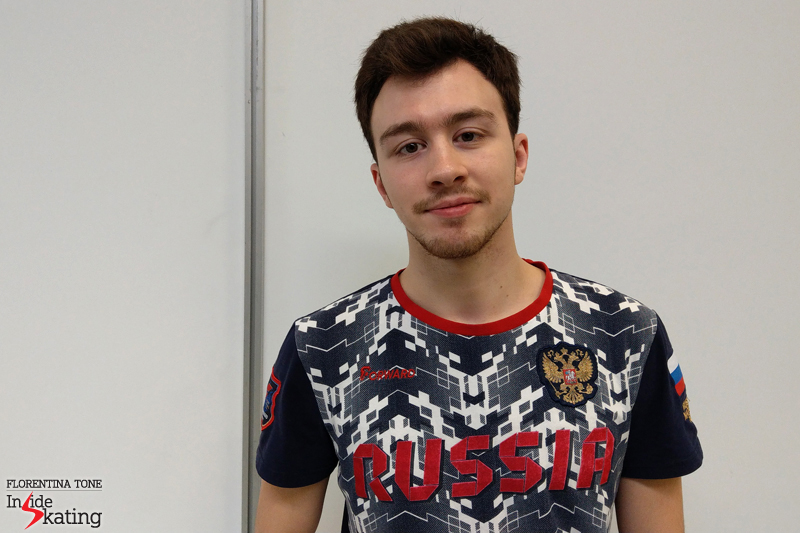
interview by Florentina Tone/Graz
Dmitri, this interview is meant to be about beginnings, about the roots of your skating journey – so my first question is this: how did you start skating and when?
Dmitri Aliev: I was 6, my first coach, Maksimov Vyacheslav Evgenyevich, noticed me in a park, in winter [in Dmitri’s hometown, Ukhta]. I was on the bars, doing pull ups or just climbing, he saw me, came up to me and said that I was very coordinated, and invited me to a practice.
And the next day, my mom and I came to the lake for my first practice. That’s how I got into figure skating. And, yes, for my very first practices, I skated on a lake.
And the coach, he turned out to be a friend of my father. But he didn’t know who I was when he first noticed me.
Has anyone in the family skated before you?
No, no one skated, there were only skiers.
Did you like it? What do you remember from back then, from those first trainings on the lake?
I remember very well my first practices – and actually even at these Europeans there is a person with whom I started skating.
It’s Vova [Vladimir] Litvintsev, who’s now skating for Azerbaijan, we started skating together in Ukhta. Vova, and also his older brother, Andrei Litvintsev, they were already skating when I joined.
We were all skating together on the lake. And on my first practice, I remember, I was already doing forward crossovers. So it wasn’t just some basic stroking or barely holding up on skates – for some reason I immediately got a hang of gliding and everything.
I liked it – and here we go.

Two boys who learned to skate in Ukhta, sharing the same moment at 2020 European Championships; Dmitri Aliev and Vladimir Litvintsev (on the second row), during the draw for the free skate in Graz.
6-YEAR-OLD DIMA: “WHAT KIND OF SPORT IS THIS, ON SOME LAKE?”
Let’s just stop here for a second: what might be your first skating memories? Not memories concerning you on skates in particular, but when you do you remember knowing something about skating? Something that you saw on TV, a relative, a friend who was skating? Or was this your first contact with the sport – when you got invited to that practice?
This was the very first time – I have never seen or heard about figure skating before.
And when I was invited, the next day I came to the practice on the lake with my mother, and there was no one else, it was dark, and I was thinking: “What kind of sport is this, on some lake? What do I do here? I don’t understand”. [laughing while remembering]
So we waited there for some time, and then, five minutes later, a car pulled up.
And in Ukhta it gets dark very early, the day is very short, especially in winter, by 3-4 PM it’s already dark. So they put a car that way so headlamps would light up the area where we skated – and we even had scrapers to clean a square of ice on the lake.
[with a smile and a confused face, as if he were still a kid discovering skating] I did not understand at all what kind of sport was that.
Of course, then I started to learn about it, I was curious. And I learned about figure skating pretty fast, thanks to some videos, to the internet that we had in some forms at the time.
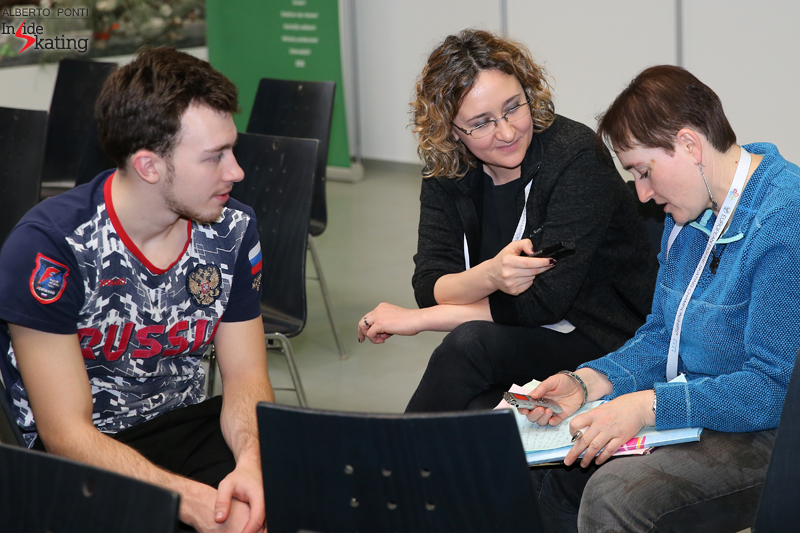
That’s how our interview went – stories, smiles, a Russian-English journey „inside” Dmitri Aliev’s career
“I’VE GOT VERY VIVID MEMORIES IN MY HEAD OF PLUSHENKO AND YAGUDIN”
When you just started skating, were you impressed by someone, by a certain skater? I might have read that you admired Evgeni Plushenko, Alexei Yagudin…
When I think about it now, the strongest memories in my head are of Plushenko, Yagudin, and Irina Slutskaya.
And when I realized that I’m not just doing skating as a hobby, just to spend time, when I realized that I’m training like an athlete in this sport, I started to get to know more about it.
I’ve got very vivid memories in my head of Plushenko and Yagudin. I was watching many-many-many of their performances, I was memorizing their programs, learning them by heart! I knew all the music they were skating too, and so on.
So for me it’s the Russian skaters of that era.
I was even trying to repeat their programs [laughing]. I would put on a video on the computer at home, turned up the volume, and I would skate along with Yagudin and Plushenko. So when Alexei Yagudin was entering a jump – I would enter that jump too, on the floor, because I already learned the program [smiling].
But for me to understand better, did you do skiing at the same time with skating? And, at what point, have you decided to give up skiing completely to focus on skating? And what made you decide to do that?
I started skiing when I was 3, and I started skating when I was 6. I stopped cross-country skiing when I was 12, so for six years I was doing both sports together.
Each day I had school in the morning, then, from 4 till 5:30 PM, I had skiing practice, and then by 6 I had to go to the rink to another practice – I was already going to the rink now – and I would go there, over the lake, on a snow-mobile.
So, in one day, I had two practices in two different sports.
I switched to just one [sport] when I was 11-12. As for how, I think now that it was fate, not really me. Well, it was my choice, but it’s more like fate gave me a sign that I just accepted.
It was one call that decided everything – when I was invited for a try-out to Evgeni Vladimirovich [Rukavicin]. Actually, when I was trying out, I still thought that we’d leave after that. But he said – You can stay. And my father rented an apartment for me and my grandmother, so we stayed in Saint Petersburg.
And that’s how fate has gifted me with figure skating.
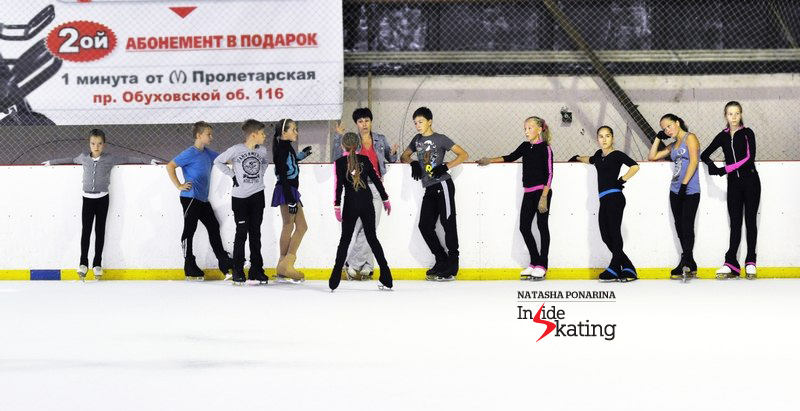
July 2012: Dmitri Aliev (in the middle, right elbow on the boards, 13 at the time) comes to Saint Petersburg for a summer camp organized by Olga Grigorieva; less than a year later he would move to train full time in St. Petersburg, in Evgeni Rukavicin’s group.
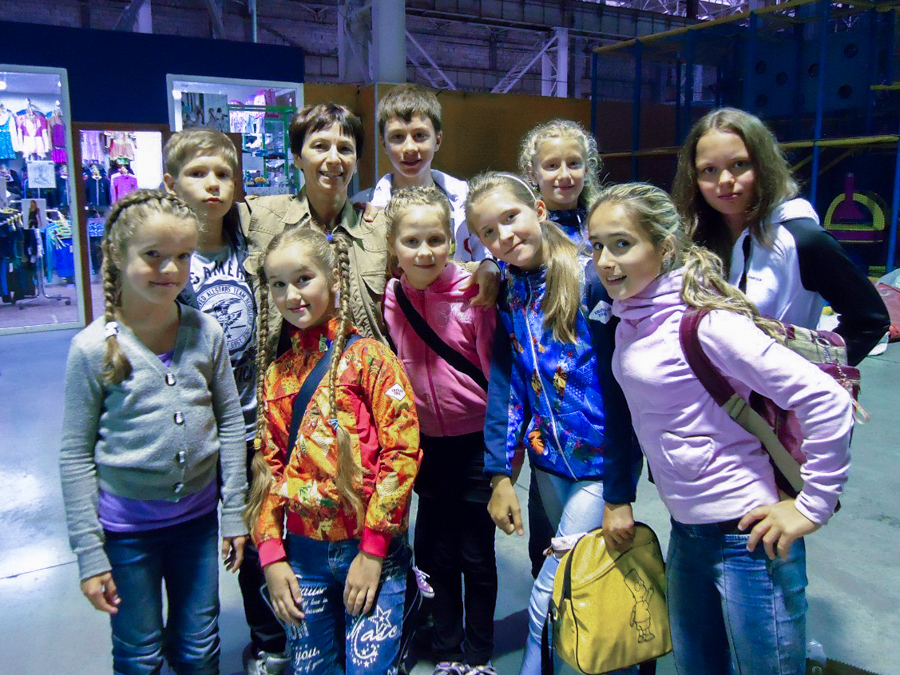
Skaters taking part in the same summer camp, in July 2012; Dmitri, the tall one in the back, alongside Olga Grigorieva.
THE FIRST MONTHS IN SAINT PETERSBURG: “LIKE THROWING A LITTLE PUPPY INTO A ROOM WITH MANY OTHER DOGS”
But did people see in you, when you were young, that you might be a good skater in the future? And, the way you see it, what makes a good skater? What qualities one should have to succeed in this sport?
I think what Evgeni Vladimirovich [Rukavicin] saw in me at once is coordination. Because in our sports we rotate a lot, and you have to be able to mobilize very quickly after it, and to hold balance.
And I was very advanced, honestly, not to exaggerate it, but in all kinds of sports, whatever I’d try – I was very good at it.
The first time I played tennis with him, when I was 9, we didn’t know each other yet, I had just arrived in Saint Petersburg with my first coach, just to see the city. I didn’t know Evgeni Vladimirovich back then – but I remember we played tennis. And he saw it in me immediately. This coordination and everything.
So as for the [other] qualities that a good skater should have, I think a skater should be all-round, a many-sided personality – because figure skating is about both dancing and jumping, the athletic part, I mean. Also a skater should be smart – one really should use their brain a lot in this sport. And also a skater should be mentally strong.
I think these are the four main qualities.
I will come back now to the moment you arrived in Saint Petersburg with your grandmother, this time to stay and practice in Evgeni Rukavicin’s group. Was it difficult for you do adjust – to leave your family, and friends, and move to a city that was so far away from home?
It was very hard in the beginning.
I didn’t go out at all at first. I didn’t understand what was going on with me for the first three months, because it was like… I don’t know, like throwing a little puppy into a room with many other dogs – he would be at a loss.
And I was like that.
I came into a big city and I didn’t understand at all what was going on around me. I didn’t go anywhere, except for McDonald’s [smiling]. I was skipping practices, skipping school at McDonald’s, I was just sitting there, just spending time there, for the first two or three months.
And I really missed my parents. It was a tipping point in my life, I was only 13, and everything was changing so much.
So it was a very difficult time. [“Ochen, ochen trudnyy period”, Dmitri says, and even if you don’t understand Russian at first hand, you understand “trudnyy” – it was hard for him]
“ONE BIG HAPPY TEAM THAT I CAN EVEN CALL FAMILY”
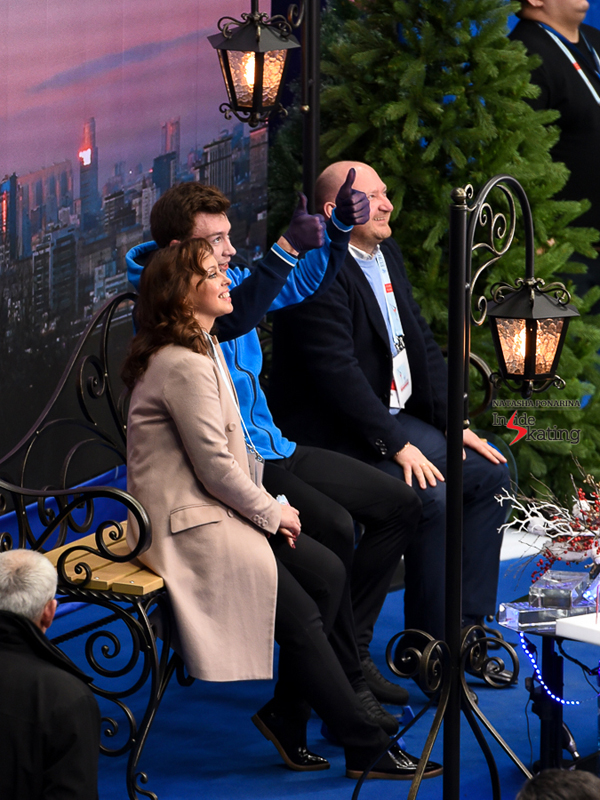
A moment of joy in the Kiss and Cry – Dmitri wins silver at 2018 Europeans – shared with a part of his team: coach Evgeni Rukavicin and choreographer Olga Glinka
You came to Egveni Rukavicin’s group – and stayed there, and you are still being coached by him. So what made you stay? Because this definitely seems like a good match, you and your team in Saint Petersburg. What do you appreciate about your training environment?
I liked absolutely everything – and I’ll try to list the main things.
First of all, all of us, not just Evgeni Vladimirovich, but everyone who works in this team – we are close like family. And it’s so great that I never even thought of leaving for another team. We all know and understand each other so well, we went through so many difficulties together – and through a lot of joys too.
It really is my family, it’s a part of my life – I don’t know how to go on without these people. How to win, how to become better, I don’t think I could do it without them.
I like how everyone is friendly, how everyone is very special. Like every coach complements one another, everyone is unique.
Evgeni Vladimirovich is very determined, he sees the goal clearly. Olga Germanovna [Glinka] is softer, but she knows and understands me on a deeper level. Valentin Nikolaevich [Molotov, choreographer] can help with other issues, Andrei Borisovich [Lushchikov, off-ice coach] – he’s very easy-going, and sometime you need that, someone who can simply say: “Dima, come on, you gotta do it, you’re the best”, just like that.
So everyone complements each other, and together it’s one big happy team that I can even call family.
Do you come back to Ukhta every once in a while during the year, do you ski with your brother? Or is skiing completely forbidden now, for fear you might get injured?
[smiling] I do ski, and I do it with great pleasure.
My whole family is made of skiers, and skiing is just amazing for me. Skiing in the forest, watching the nature, just enjoying the glide…
No one ever forbade it for me and no one ever will, because it’s a part of my life, and it’s simply amazing.
FINDING INSPIRATION
What inspires you in general? And what do you do in order to become a better skater? Listen to music, go to concerts or some other shows, read… where do you find inspiration?
First thing that inspires me is music. It can be different kinds of music, depending on the mood. Sometimes it helps me to relax, sometimes, the opposite – it charges me with energy. I’m not even sure how to answer this question properly… [laughing].
What about the skaters that are now around you – do you admire particular qualities in them? They can be inspiring as well…
[quickly, categorically]: Yes, I do.
I can definitely name Kévin Aymoz here, if we’re talking about this European Championships. I really like his skating skills and his programs this season. They’re in a new style, and it’s just great, because time passes by, new styles come along and his new style is just spot on.
I also respect and admire Nathan Chen a lot.
I know him pretty well and I really like his jumps, his mindset, and he’s a really nice person. But he speaks very fast English so no one can keep up with him [laughing]. I can talk about many people, but if we talk about the one who makes the greatest impression for me – it’s Nathan Chen.

At 2015 Junior Grand Prix Final in Barcelona, alongside Nathan Chen and Sota Yamamoto; the three will share the podium at JGPF, Dmitri winning silver.
“THANK YOU, DIMA…”
Dmitri, you once said that you want your programs to be not puddles, but flowing rivers. That is such a beautiful image, such a beautiful metaphor – care to elaborate on it? And is there a particular performance of yours that you feel it was exactly that, a flowing river?
I think my free skating at 2018 European Championship was an embodiment of that image. That was really a flowing river. And this European Championship was different – I can’t come up with a metaphor, but it was different.
For every person, everything that they do – it’s their life’s journey. And a river – it has its own way. It’s always flowing, it doesn’t stop, it always goes forth, through the mountains and everything – it always finds a way. And so a person should find their way, where to flow, should make certain decisions at the right moments.
In programs you want to show some pieces of your life, so to speak, or some pain, and I picture it like that, like everything should stem from one another. It’s like a flowing stream. And our elements are like that too. Maybe it’s difficult to explain it, but that’s how I see it in my head.

The embodiment of the river-metaphor: Dmitri Aliev during his short program in Espoo, at 2018 Finlandia Trophy
Of course it’s so very early to talk about that, but the end of your career, how do you want to be remembered?
Honestly, I don’t know. Of course, I want to be remembered by my best, but right now I’m just happy to give people joy, to tell them something with my skating.
I don’t want to think about the end, I just want to make people smile.
We all live for emotions, I guess. So when it happens, I think I just want people to smile and say: “Thank you, Dima, for being so genuine and sincere” [smiling].

»» SEE MORE: DMITRI ALIEV. HIS CAREER, A RIVER FLOWING THROUGH SEASONS, 2014-2020
2014 Nikolai Panin-Kolomenkin Memorial, St. Petersburg

Dmitri Aliev skating his “Cowboy” short program, at 2014 Nikolai Panin-Kolomenkin Memorial (also known as Panin Cup) in St. Petersburg, October 2014

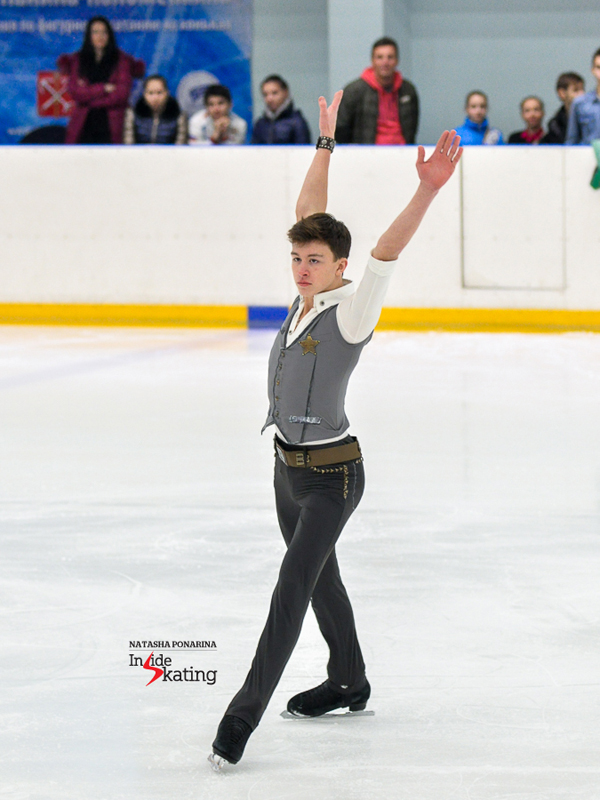


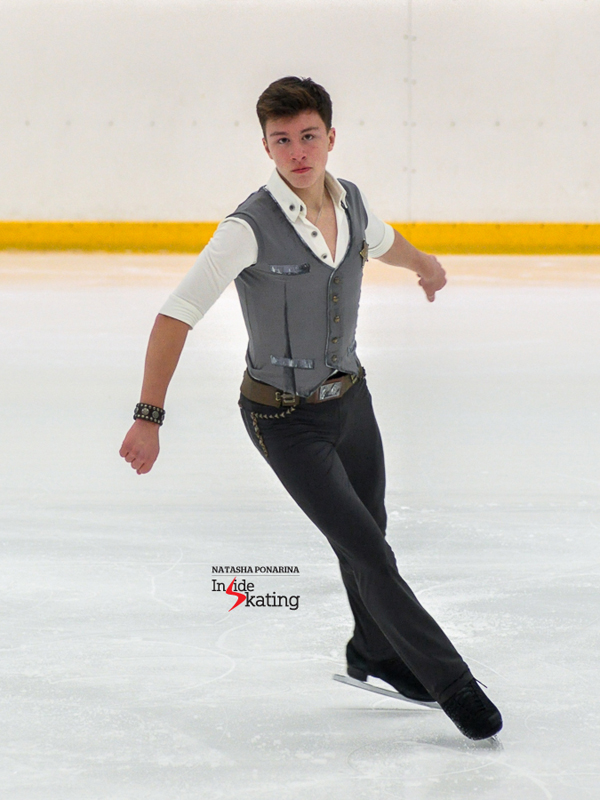

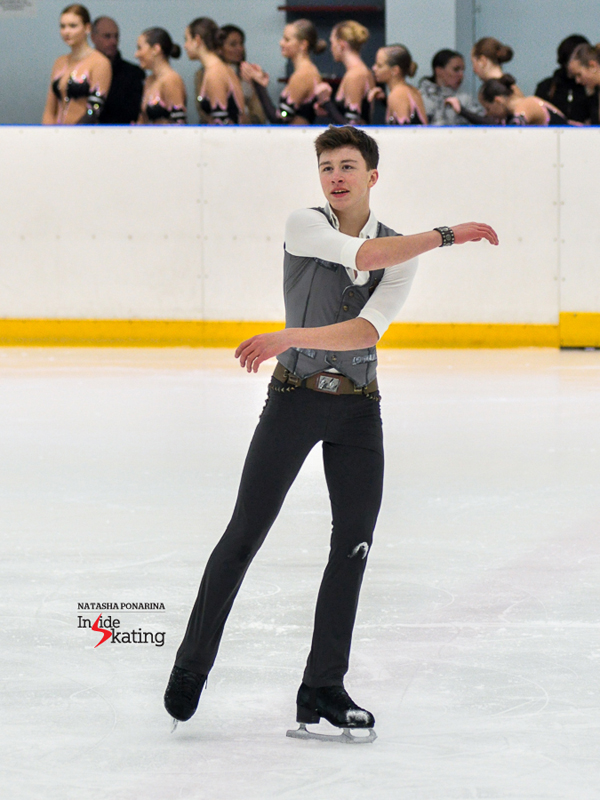
2015 Junior Grand Prix Final, Barcelona

One with the story of “Notre-Dame de Paris” – Dmitri skates to “Le temps de Cathédrales” and “Tu vas me détruire”

2016 Nikolai Panin-Kolomenkin Memorial, St. Petersburg
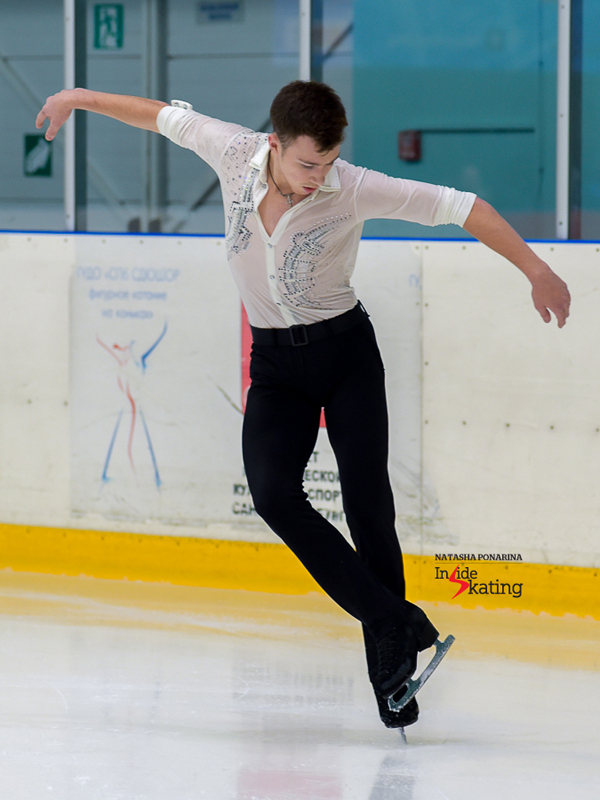
October 2016: Dmitri Aliev, feathers in the air, performing at Nikolai Panin-Kolomenkin Memorial
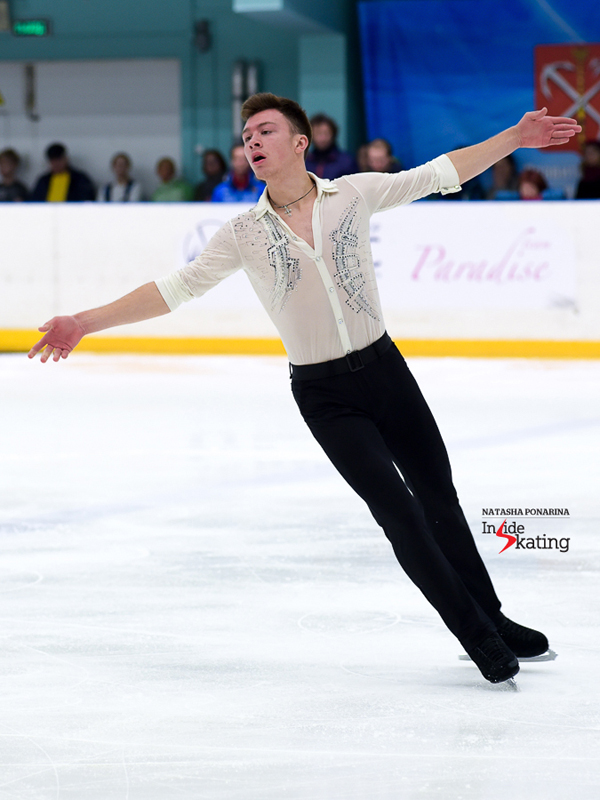


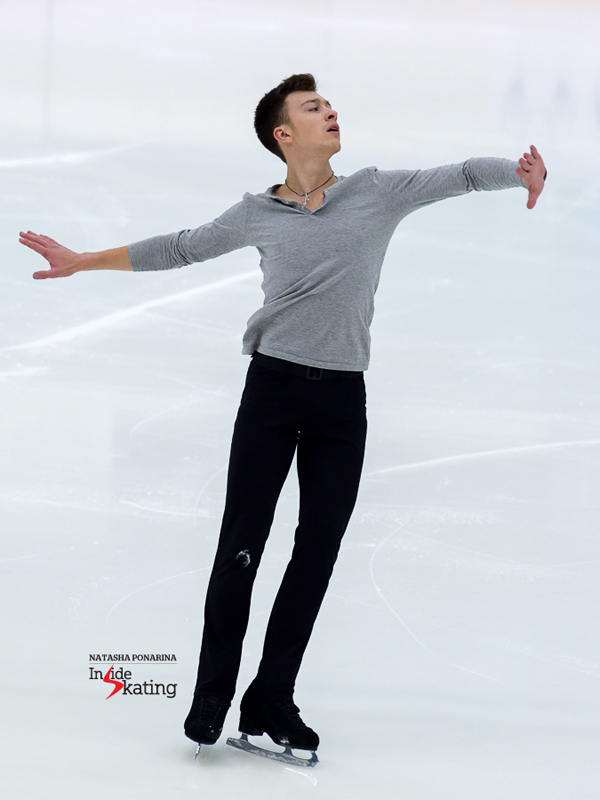
And you can almost feel the wind…
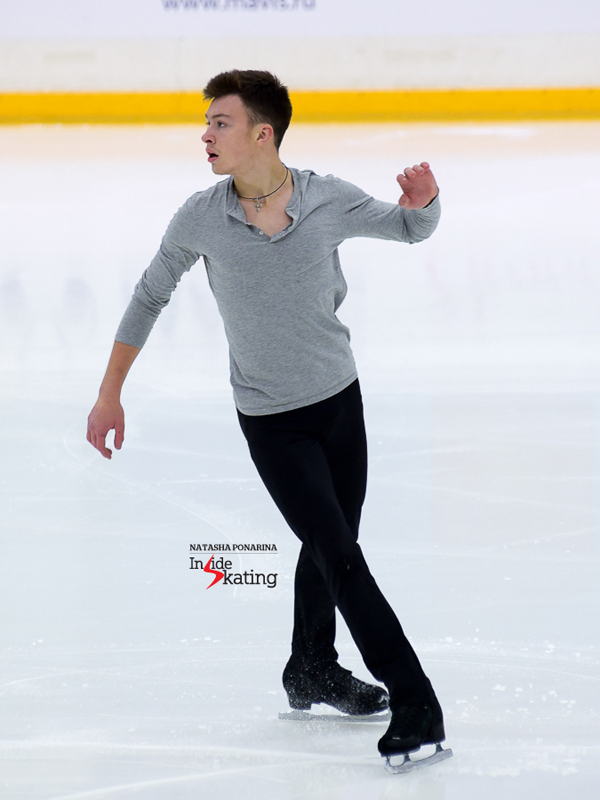
2017 Russian Junior Championships, St. Petersburg

Bird set free
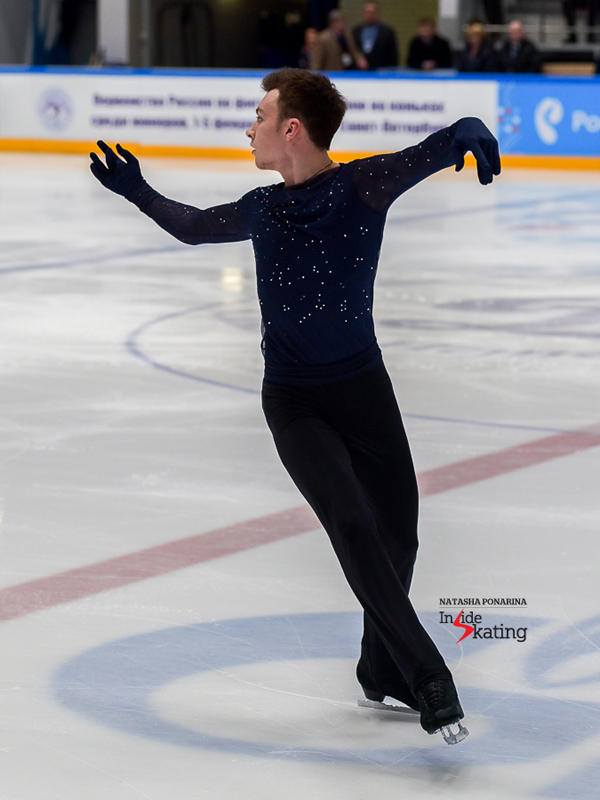
Dmitri Aliev, performing in St. Petersburg, at Russian Junior Nationals, in February 2017 – he won the competition. There you have him skate his long program, a beautiful, emotional skate to „Broken Vow”, performed by Josh Groban.
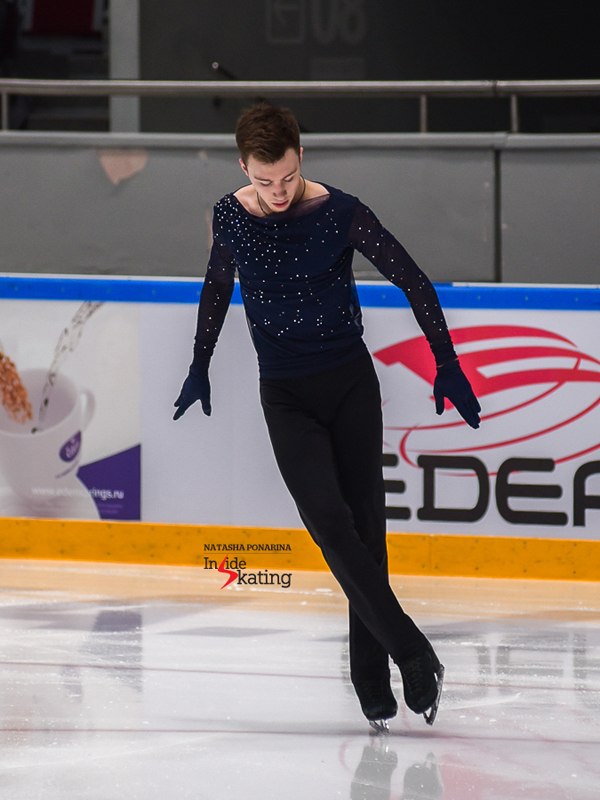


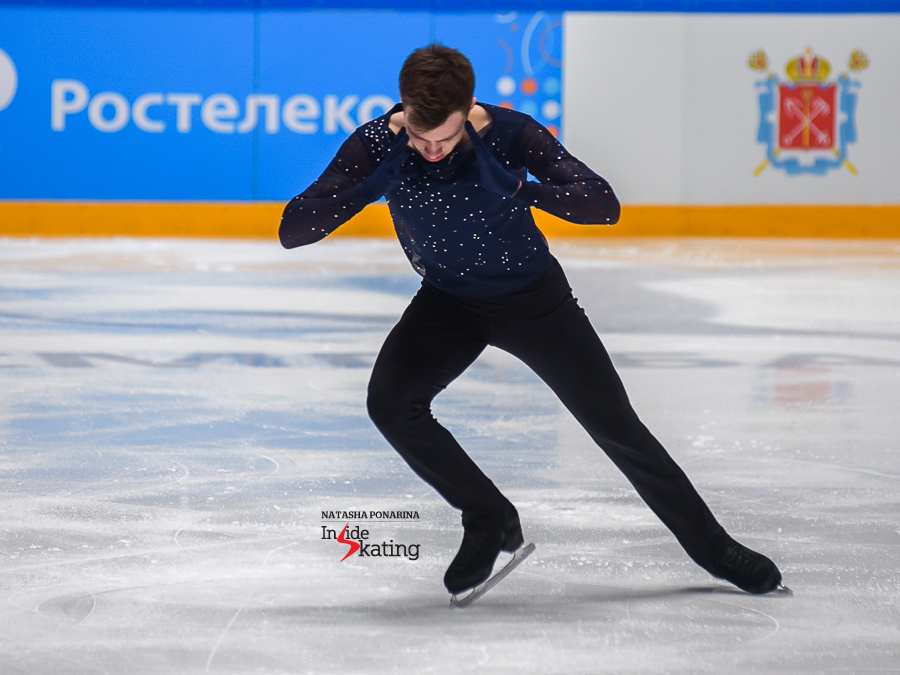



Spinning under the attentive eyes of Evgeni Rukavicin and Olga Glinka


Dmitri and his team in the Kiss and Cry – while fans aligned on the right are waiting for his precious signature
2017 Rostelecom Cup, Moscow
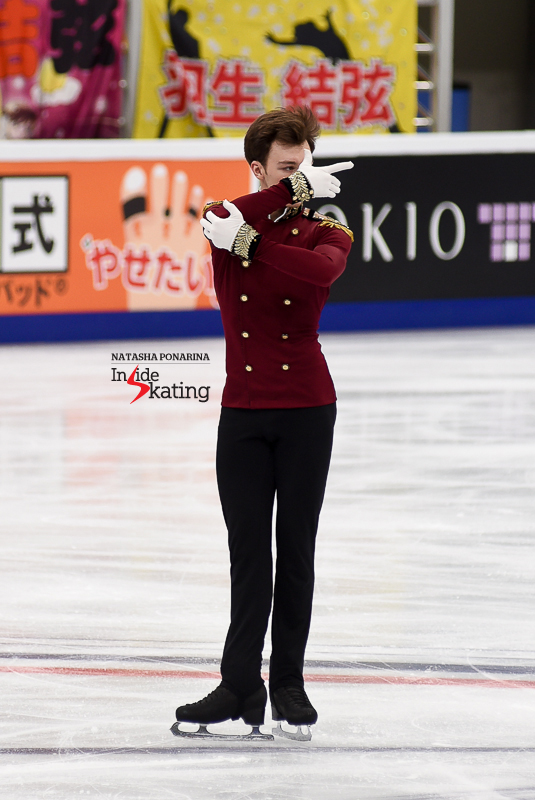
It’s time for Dmitri Aliev first senior season on the international circuit – and there you have him making his Grand Prix debut, at 2017 Rostelecom Cup, in October. And he has chosen a marvelous piece of music to skate his short program to: “Masquerade Waltz” by Aram Khatchaturian.
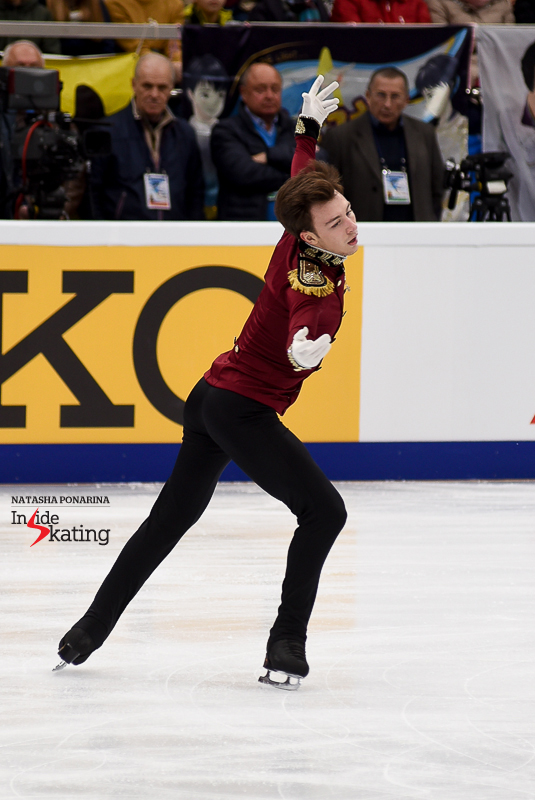
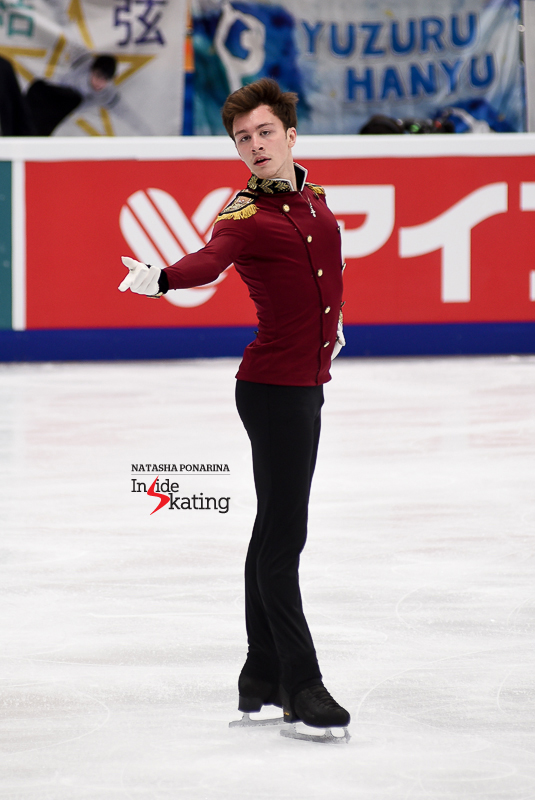

In the free, Dmitri skates to “To Build a Home” and “Little Miss Sunshine”
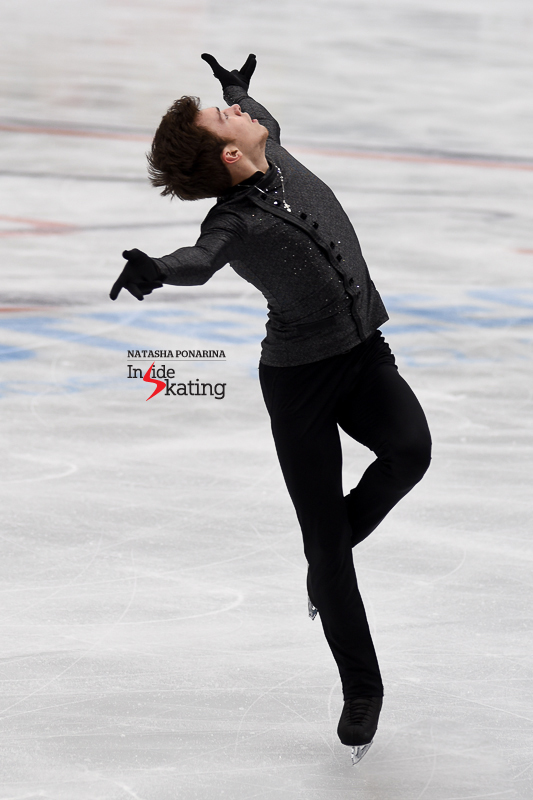

In focus: Dmitri Aliev skating in a gala in St. Petersburg in December 2017
2018 Europeans, Moscow
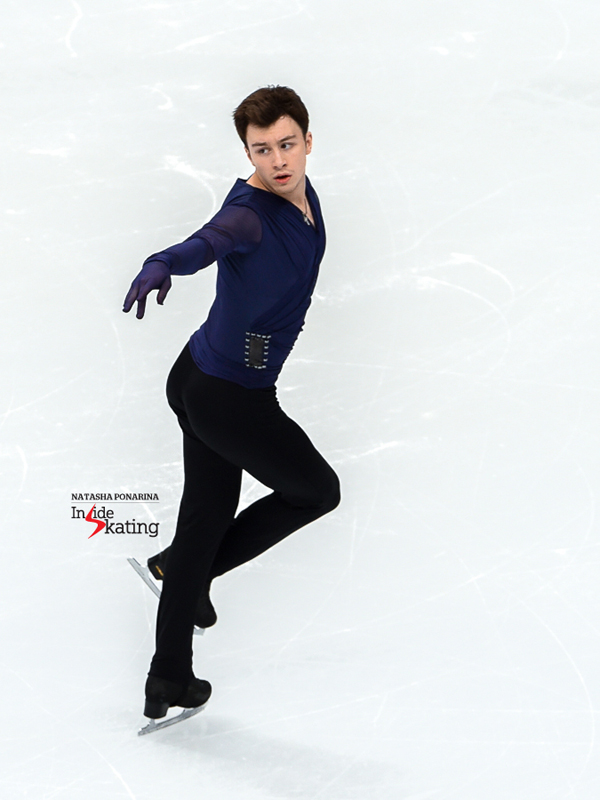
But for Dmitri Aliev the best is yet to come: in January, at the 2018 European Championships, he’ll skate for a medal in Moscow; he’ll eventually win silver and share the podium with Javier Fernández (gold) and Mikhail Kolyada (bronze). But first comes first: Dmitri, skating his long program, accompanied by “To Build a Home” and “Little Miss Sunshine”.
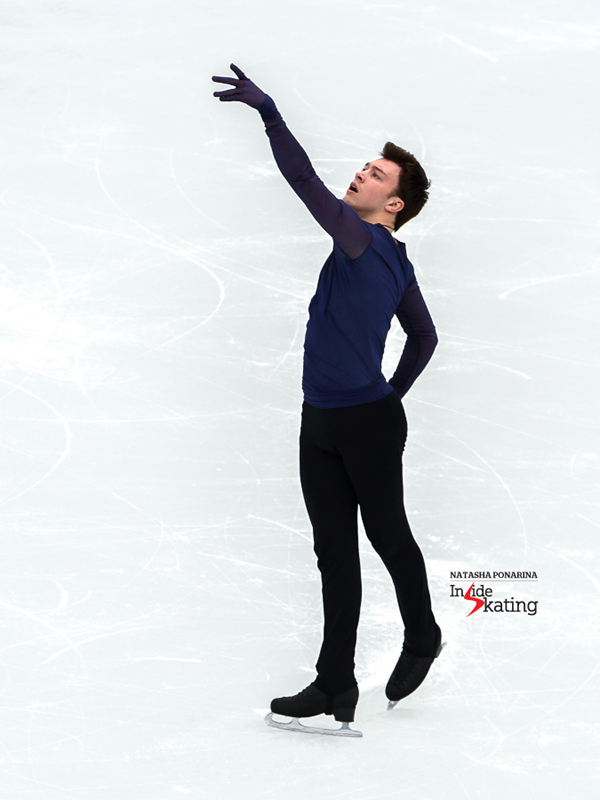

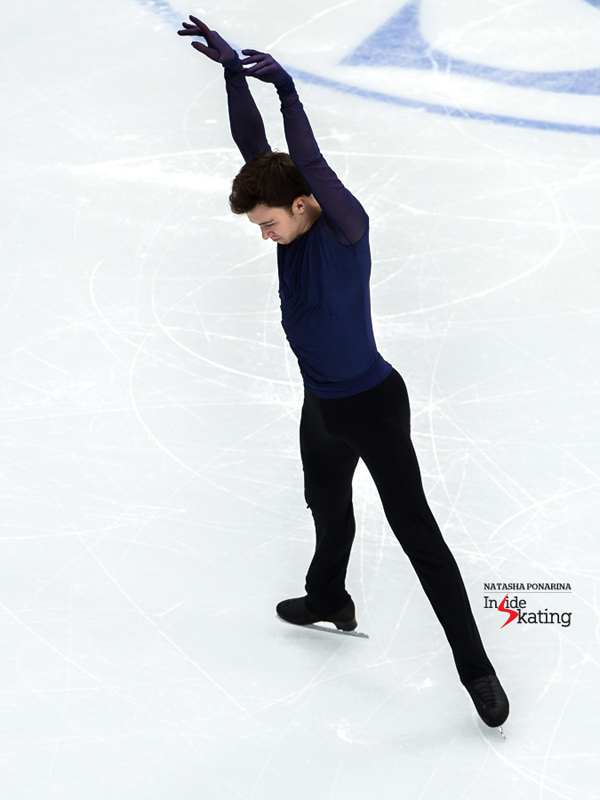
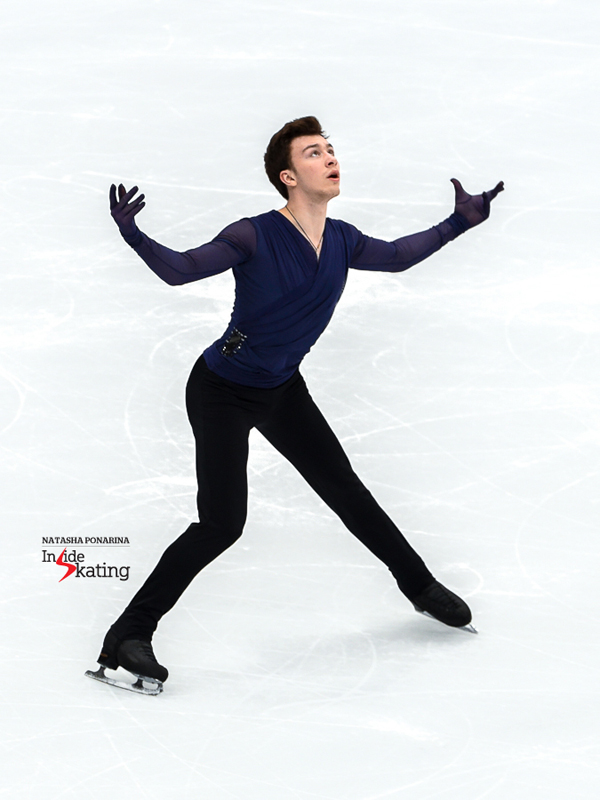
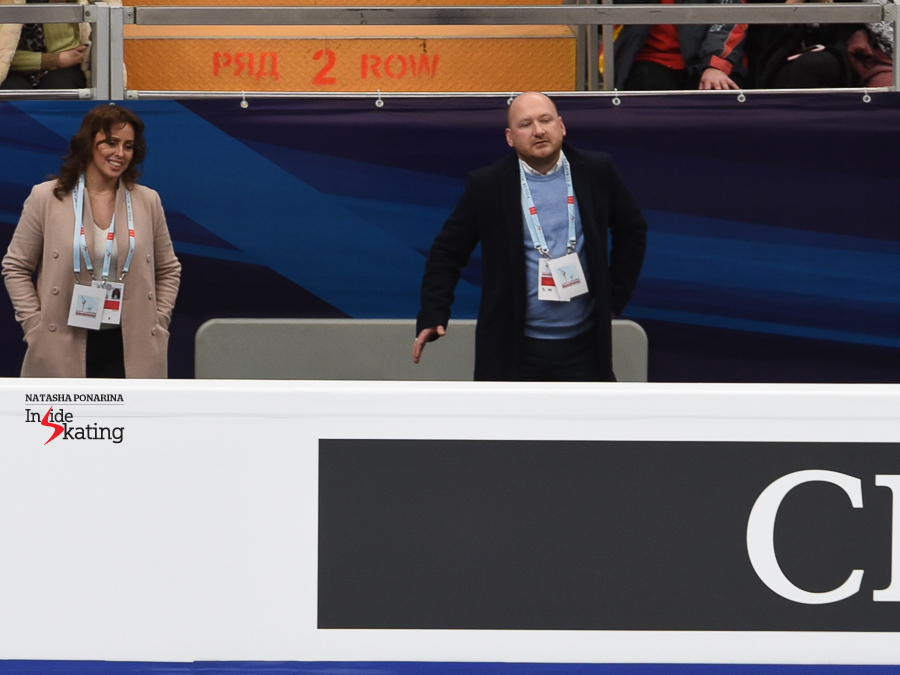
Evgeni Rukavicin, Olga Glinka, living the emotions at the same time with Dmitri

And that was it – victorious fist in the air…

And relief, shared joy in the Kiss and Cry
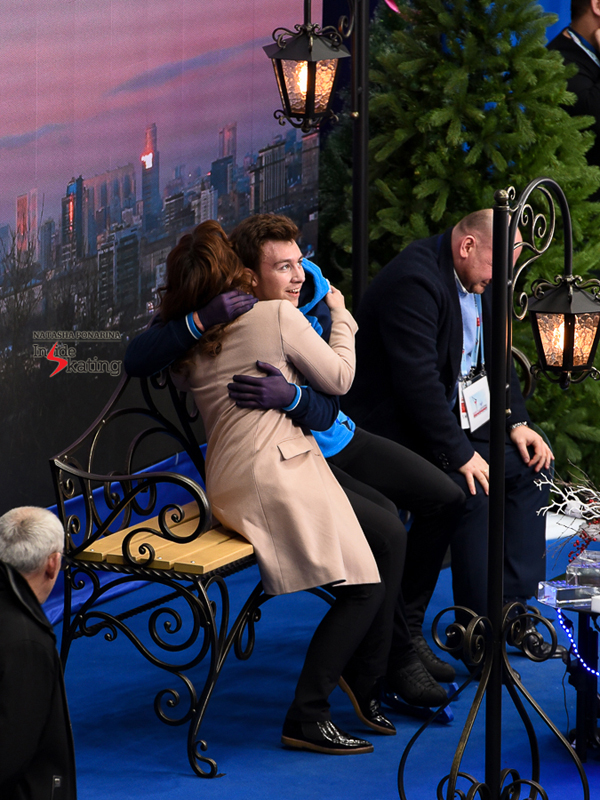


Dmitri has done it – won the silver in his debut at Europeans


Don’t go too far though – we’re sharing with you a couple of informal glimpses from the Europeans: Dmitri, signing autographs (above), Dmitri posing for photographers after the short program, with the mascot of the Championships as well (below).

2018 Finlandia Trophy, Espoo
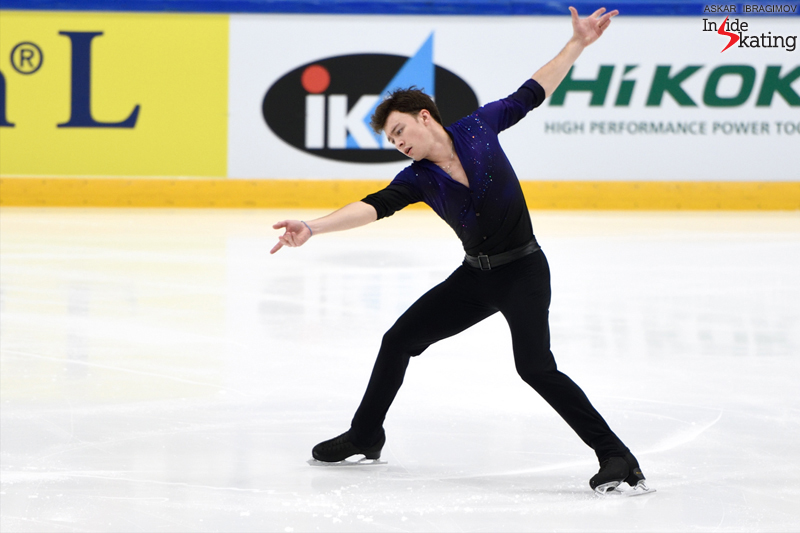
In the post-Olympic season, Dmitri Aliev’s presence on the international scene is rather scarce – due to his 5th place finish at Russian Nationals, he doesn’t get go to Europeans and Worlds. But in the first part of the season, he’s present at 2018 Lombardia Trophy, at 2018 Finlandia Trophy (see the following photos), 2018 NHK Trophy and 2018 Internationaux de France.

Skating his short program in Espoo, at 2018 Finlandia Trophy, to “Modigliani Suite” by Guy Farley

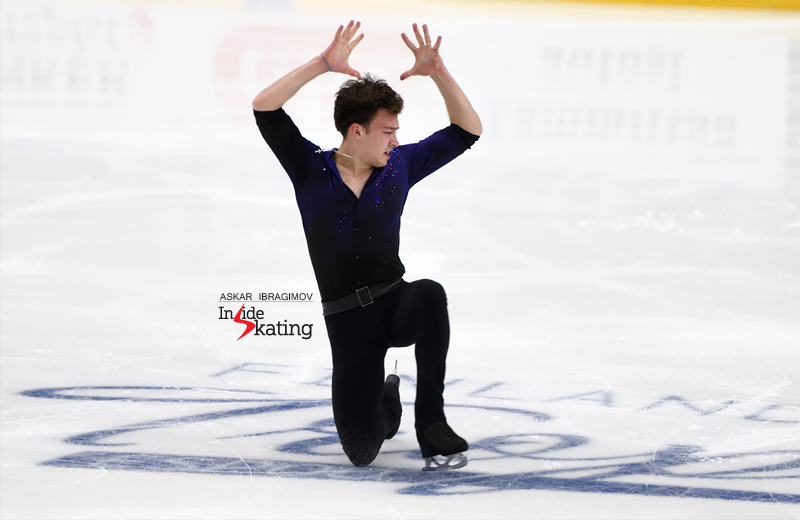
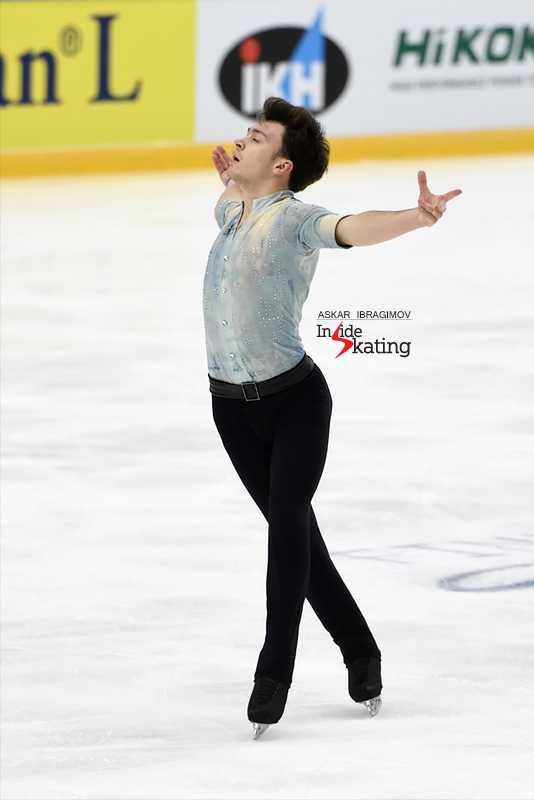
For the long program that season, Dmitri has chosen to skate to “Clouds. The Mind on the (Re)Wind” by Ezio Bosso, a marvelous choice of music – and it’s a pity we didn’t see that program as much as it deserved.

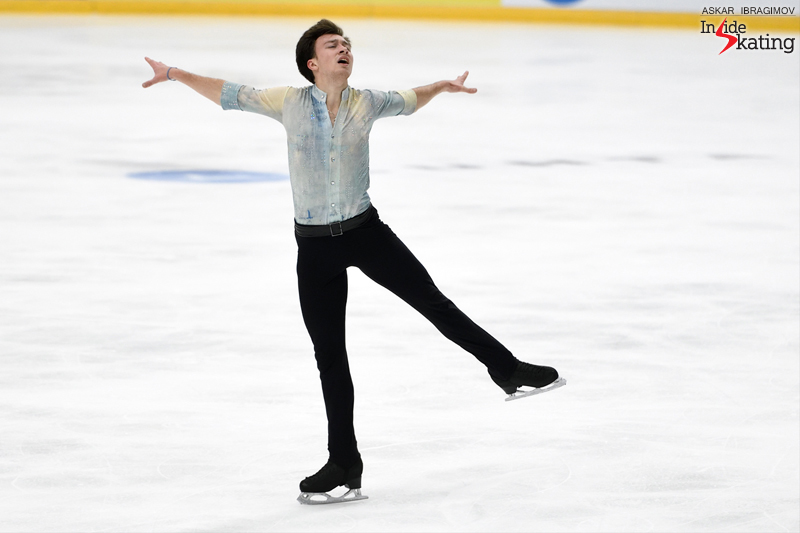

2019 Moskvina & Mishin 50 Gala in St. Petersburg

Dmitri Aliev, skating at Moskvina Mishin 50 Gala in St. Petersburg, in March 2019 – a joint anniversary of Tamara Moskvina and Alexei Mishin, celebrating 50 years of coaching
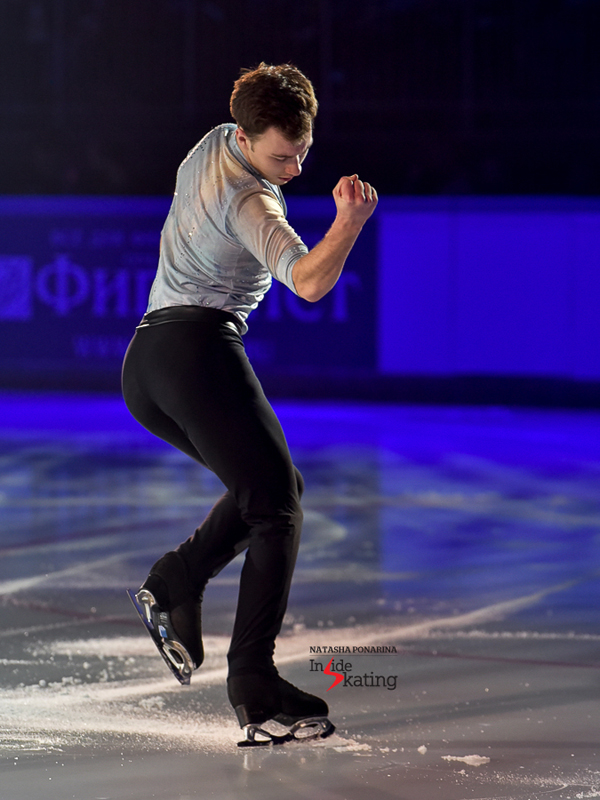
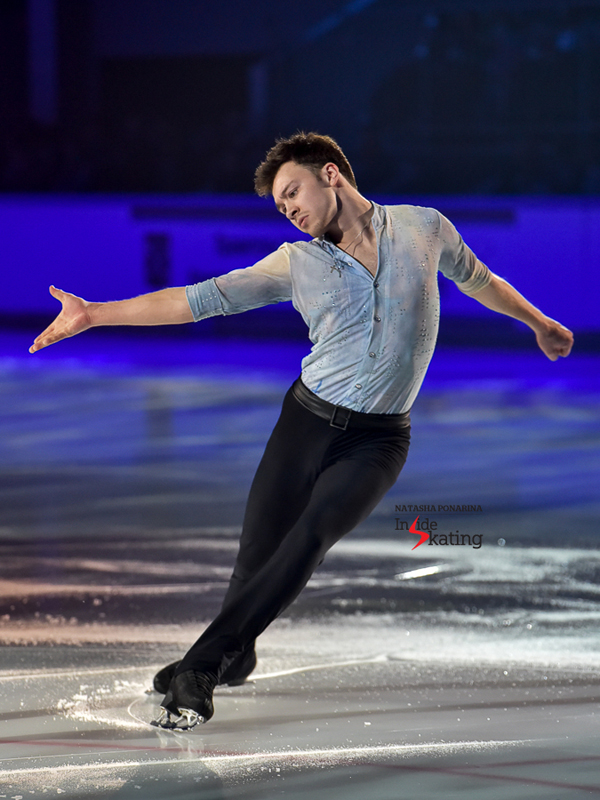
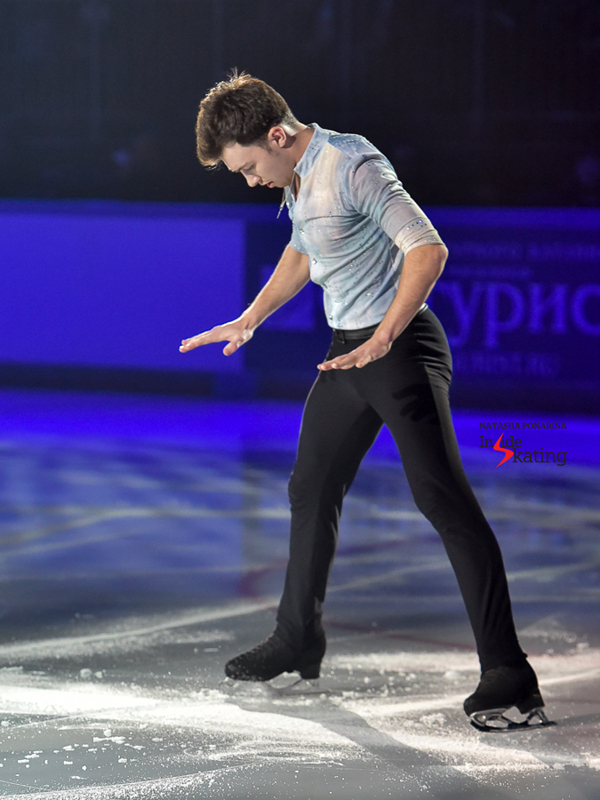


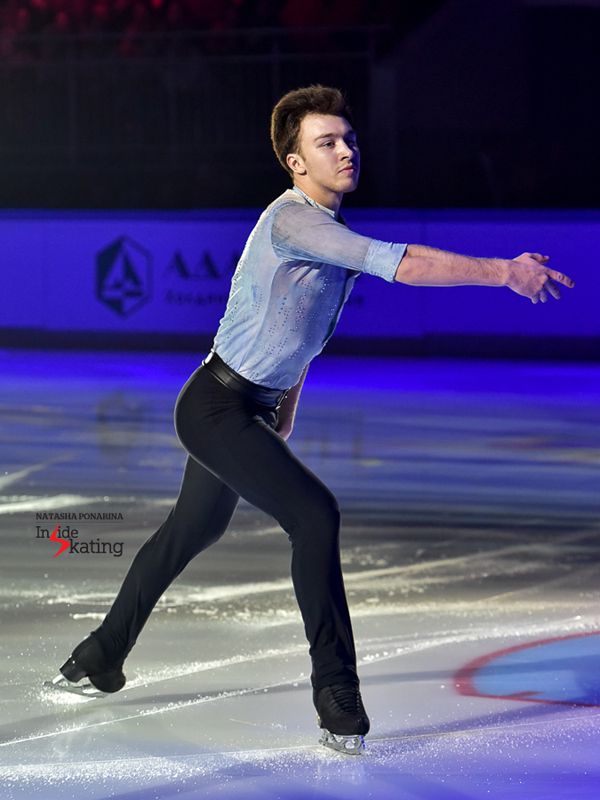

2019 Rostelecom Cup, Moscow
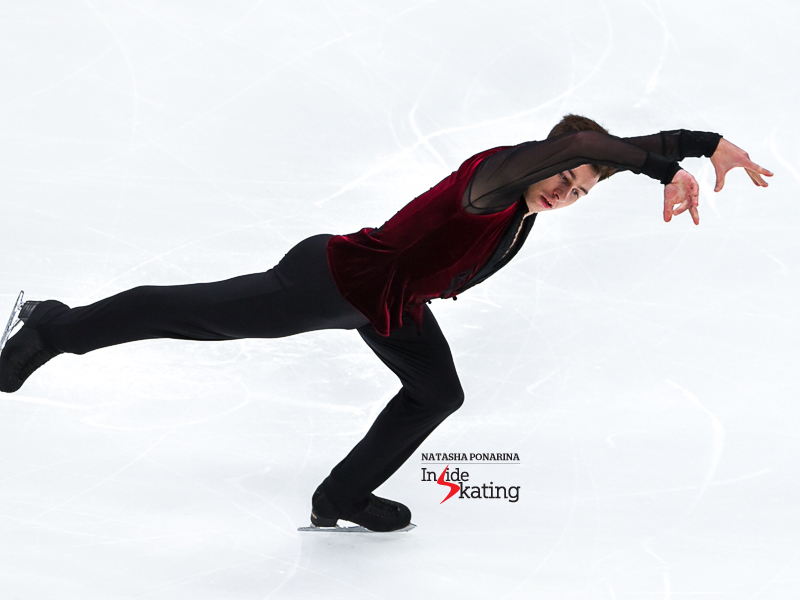
Dmitri Aliev, sleeping on the roses – as his short program music says (“Je dors sur des roses”), at 2019 Rostelecom Cup in Moscow
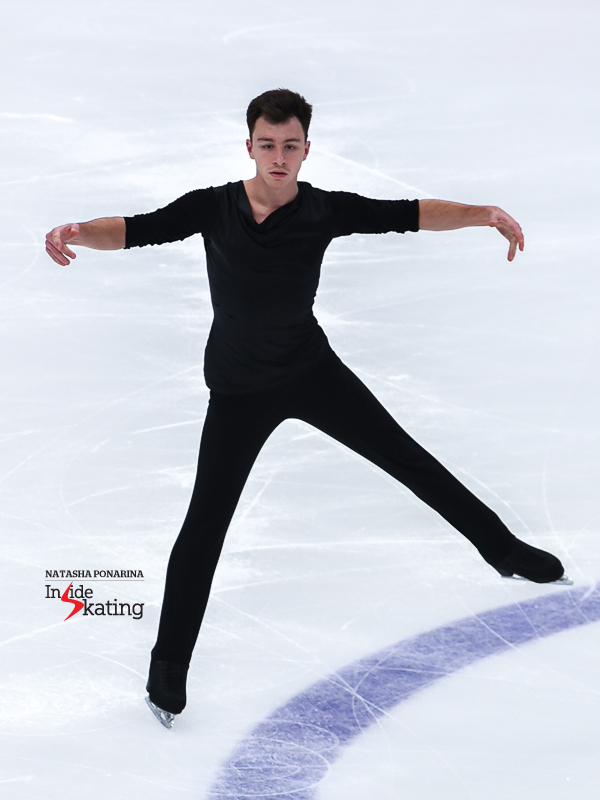
Taking the audience with him, while skating to “The Sound of Silence”, Moscow, November 2019
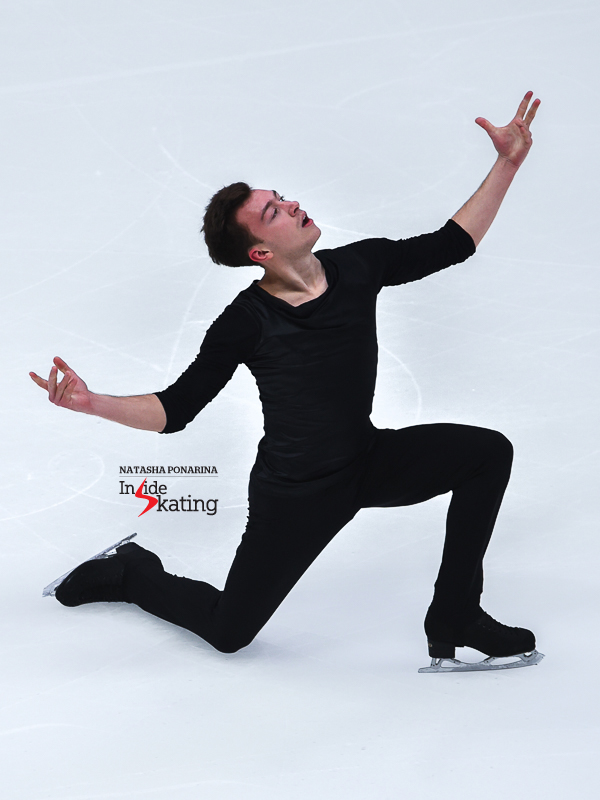
2019 Grand Prix Final, Turin

In December 2019, Dmitri Aliev was one of the six top skaters of the world qualified for the Grand Prix Final in Turin – it was his first senior Final, and the nerves got to him; but he still managed to convey emotions during both of his programs.
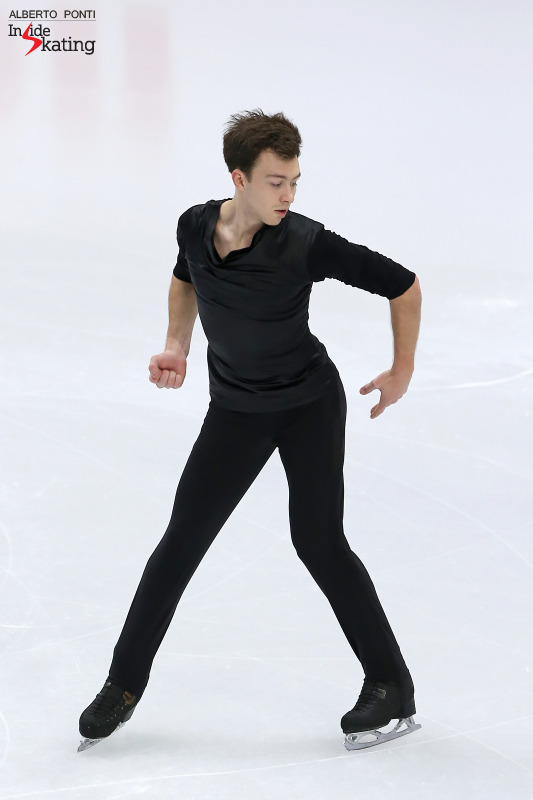


2020 European Championships, Graz

We didn’t know it back then – but the final chapter of this season, for Dmitri Aliev, happened in Graz, in January, at 2020 Europeans; and Dmitri finished the Europeans in triumphant style, winning his first European crown.

Hear him say, after the short program, more like a premonition: “The generations change and there are new skaters to take the podium of the Europeans”.
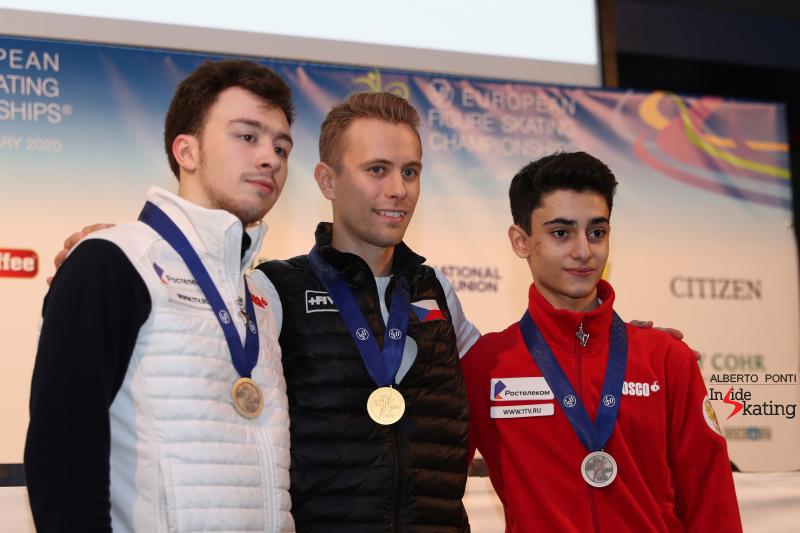
Top 3 men after the short program – Dmitri sits in 2nd place
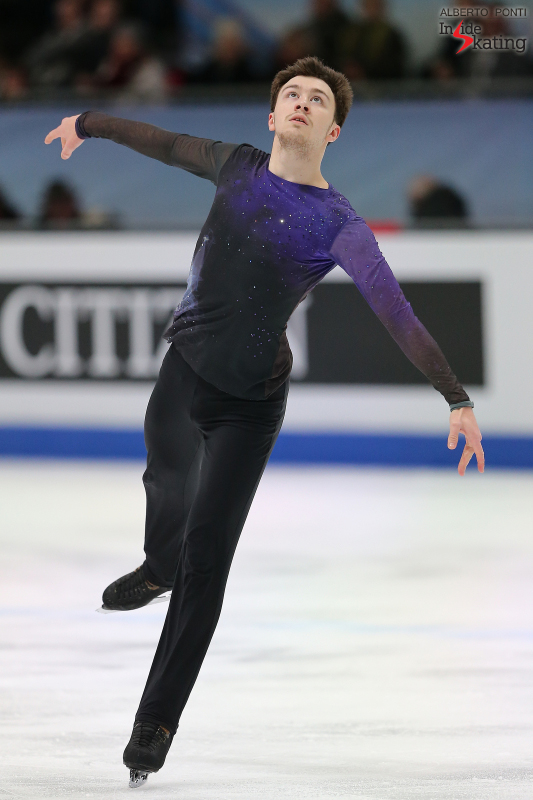
Watch him skate his long program in Graz, making the story, making the music his. And you can almost hear the silence…
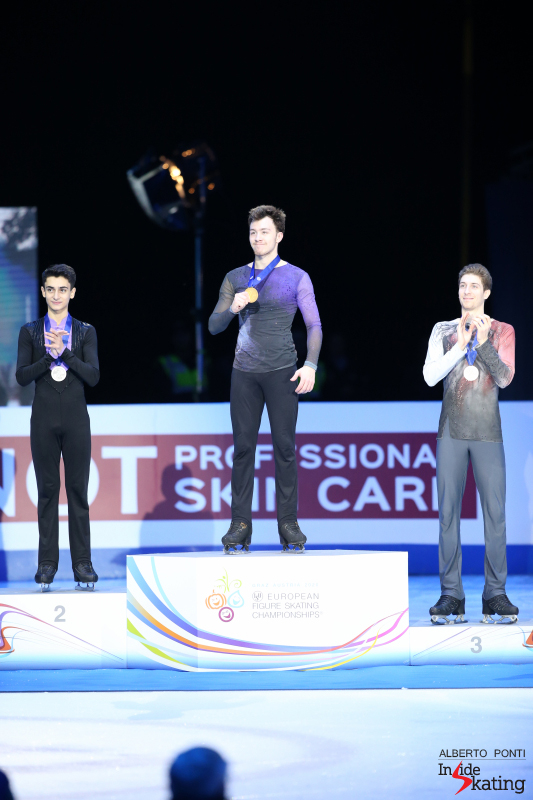
“At the end of my program I cried out of happiness and feeling proud. I could not hold back the tears because right away I had images in my head of how I prepared for this competition. On the podium I just felt crazily happy – it was like a firework inside. It was happiness and an inner smile. I have not yet realized that I won, but I feel it”.

[interviewer: Florentina Tone, Graz/interpreter: Tatjana Flade, Graz/verbatim translation: Nadia Vasilyeva/photos by Natasha Ponarina, Alberto Ponti, Askar Ibragimov, Florentina Tone]
